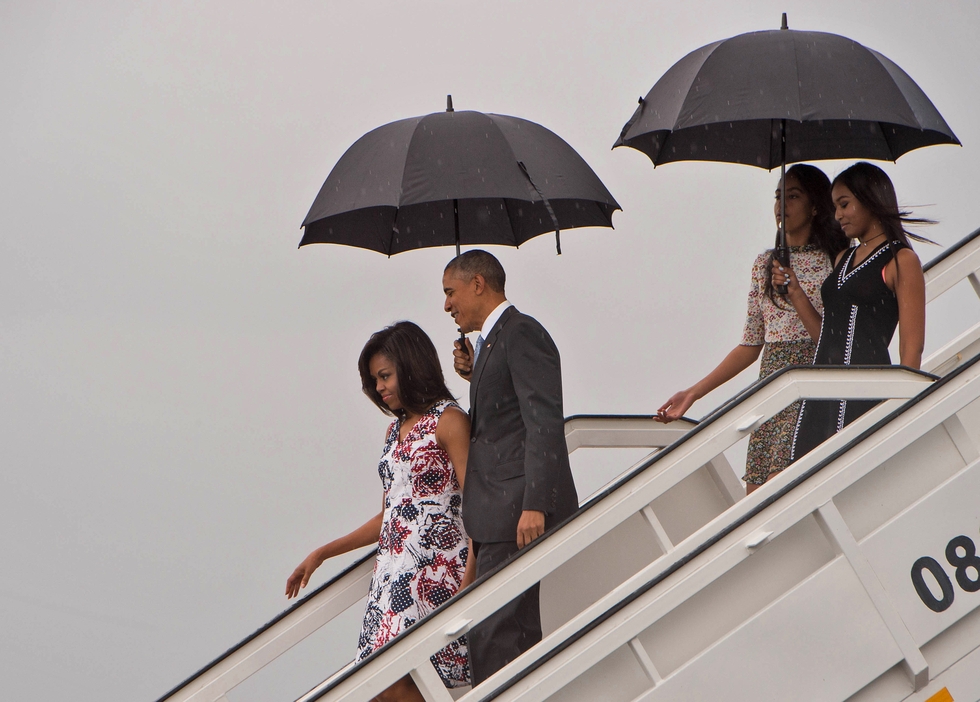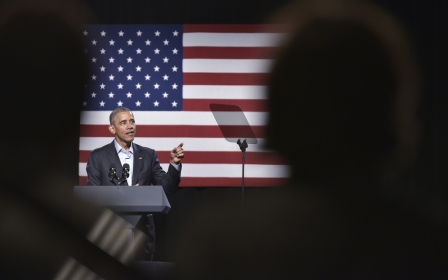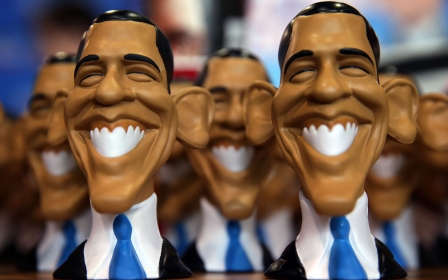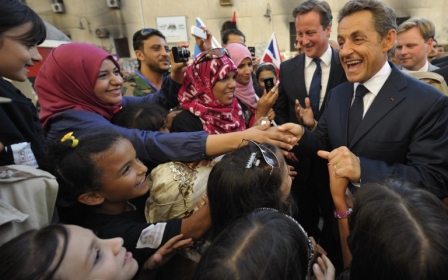Obama’s rational choice doctrine and the impotence of power

As Obama arrived in Cuba over the weekend for an historic visit to the Communist-ruled island, symbolically ending more than half a century of hostilities, he could be forgiven for feeling a sense of triumph. The Cuba rapprochement followed the Iran nuclear deal of last summer, which, though not popular with some allies and yet to be fully tested, is a further testament to his attempts to wind down decades-old policies of confrontation.
Since his mammoth Atlantic interview, commentators have poured over the remarks of the president in an attempt to understand his foreign policy doctrine. But there is one underlying philosophical principle that emerges from Jeffrey Goldberg’s interviews that has been overlooked: his adherence to rational choice theory.
This economic theory, which posits that people act according to “rational self-interest” as individuals in a free market system, was to the fore when Obama complained to Goldberg about “free riders”. He was specifically talking about US allies Britain and France, who he suggested had not pulled their weight following the Libyan intervention of 2011.
Free riders are a famous conundrum of game theory - sister to rational choice - and occur when some actors benefit from the actions of others without contributing to the cost. Historically, rational choice theory as a useful view of human behaviour caught on in the 1950s and soon pervaded the thinking of American political scientists as well as economists.
"Free riders aggravate me," Obama told Goldberg. The president complained that America's friends and allies in Europe and the Middle East talk big but want the US to do the heavy lifting in terms of military action. It is the common refrain of an imperial power straining under the weight of maintaining hegemony while in long-term decline.
For years America has urged its allies to spend more on the military, so that America does not stand alone in its global policing efforts. Given that the US spends the same on its vast global military operations as the next nine countries combined, with an archipelago of bases in 80 countries, this complaint is at best disingenuous. At $600 billion annually, the US military budget is already an obscene misallocation of resources that could otherwise solve just about any problem humanity faces – hunger, poverty, global warming, you name it.
Further, it is not as if US Middle East allies such as the Saudis, Emirates and Israel are not hiking up their purchases of Western military hardware, most of it American. Given the vast quantity of weaponry that America already pours into the Middle East, with bombs being dropped by a dozen countries in at least five conflicts - Syria, Iraq, Libya, Yemen, Israel-Palestine, not to mention Egypt’s Sinai - less military engagement might actually be a good thing.
Obama also defended himself against critics of his Syria policy, for failing to more robustly support the rebels and act on his own “red lines”. In the Atlantic piece, the comparison is drawn to President George HW Bush who, in 1991, called on the Iraqis to rise up against Saddam Hussein, before refusing to help them, for fear of what would replace Saddam should he be overthrown. For that history lesson, we had to wait for his son George W Bush. This is where Obama draws his doctrine – the idea of “don’t do stupid shit” that was epitomised by the invasion of Iraq and the dismantling of that country’s army, sparking a never-ending sectarian spiral.
As commander in chief, Obama does not believe that tens of thousands of innocent people dying in Syria are sufficient reason for America to go to war. He believes America must act in its national security interests, and to intervene in a bloody civil war that does not directly threaten US security is bad policy with unknown consequences. Essentially, Obama is risk averse. Aggressive intervention can produce Iraq or Libya. But equally, and this is where the criticism sticks, more limited intervention through allies and proxies can give you Syria – a war with a death toll equal to Iraq’s and millions more displaced.
Obama's neoliberal values
In the interview, Obama defended his decisions against charges of cold-hearted realism, going on to say: “I am also an idealist insofar as I believe that we should be promoting values, like democracy and human rights, and norms and values, because not only do they serve our interests the more people adopt values that we share - in the same way that, economically, if people adopt rule of law and property rights and so forth, that is to our advantage - but because it makes the world a better place.”
There it is: a statement that best expresses the limits of Obama’s vision, sounding as it does like someone who has ingested a US political science textbook rather than a leader with deeply held personal beliefs. It crystallises Obama’s rational choice view of the world, in which ideas such as human rights, justice, solidarity and so on must be folded into a strictly “rational” neoliberal view of global order.
In this view, the US is best served when it seeks to shape other players to the way of the rationally self-interested western-minded political actor, who looks at the world coolly like a profit and loss accounting exercise. Those irrational foreigners with their pre-modern religions, their ideas of nationalism, socialism and self-determination, must be persuaded and cajoled into the higher planes of capitalist rationality. With the help of globally enforced property rights, international trade and technology, gradually these “irrational” ideas will die out, leaving rational players to get on with business and trade in peace, policed by drones to take out the few remaining extremists.
Democracy and human rights, in this world view, flow forth like melting snow from the peaks of a free market Olympus. There are no real contradictions between the cries for human justice and dignity, and the interests of corporations and money-grabbing oligarchs. All meet on the playing fields of rational choice, free riders notwithstanding.
Tragically, as we know, imperialism, colonialism and dictatorship, western backed or otherwise, do not play by the rules of rational choice theory. People, groups and states often act according to values that do not derive from rational self-interest – deeper loyalties and a preparedness for sacrifice, a yearning for historic justice or simply fear may ultimately drive them. In fact, Obama gets this more than most US leaders, growing up as he did in Indonesia and Hawaii, where he experienced first hand what it’s like to live at the empire’s margins.
Obama the executioner
Yet he is now the executioner, the boss who signs off the “kill list” for America’s drone assassination programme, a kind of neat technical fix for the blood price of empire. And despite his spats with Israel’s Benjamin Netanyahu, Obama has always signed the cheques to replace the bombs and bullets that Israel fires at Palestinians resisting occupation. He admitted this basic contradiction – the same that applies to US military support to Saudi Arabia and Egypt - when he told Goldberg: “There are going to be times where our security interests conflict with our concerns about human rights.”
Obama deserves credit for winding down an historic US policy of global bullying and militarism. His successes are real, but so are his failures, notably the Israeli occupation and siege of Gaza, the failure to close Guantanamo, and the war in Syria. In the case of the latter, there are still 10 months of his presidency for some kind of imperfect peace to emerge, too late though for half a million Syrians.
Perhaps one day America will have a president who looks beyond cold-war economic theories underlying much US foreign policy thinking and find a life-valuing universal morality that does not try to rule the world according to the calculus of long dead economists.
- Joe Gill has lived and worked as a journalist in Oman, London, Venezuela and the US, for newspapers including Financial Times, Brand Republic, Morning Star and Caracas Daily Journal. His Masters was in Politics of the World Economy at the London School of Economics. @gill_joe
The views expressed in this article belong to the author and do not necessarily reflect the editorial policy of Middle East Eye.
Photo: US President Barack Obama, Michelle Obama and daughters Malia (2nd R) and Sasha (R) disembark from Air Force One at the Jose Marti International Airport in Havana on 20 March 2016. (AA)
New MEE newsletter: Jerusalem Dispatch
Sign up to get the latest insights and analysis on Israel-Palestine, alongside Turkey Unpacked and other MEE newsletters
Middle East Eye delivers independent and unrivalled coverage and analysis of the Middle East, North Africa and beyond. To learn more about republishing this content and the associated fees, please fill out this form. More about MEE can be found here.





